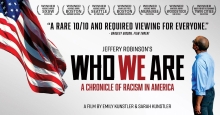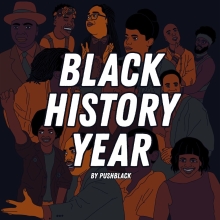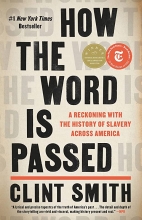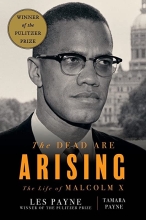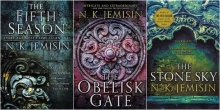
The School of Public Policy is committed to creating a thriving, inclusive environment at the School, where everyone takes an active role in incorporating diversity, inclusion and belonging into their work, classroom and interactions with students and colleagues. To that end, we’re excited to share our monthly recommendations for books, poetry, documentaries, podcasts, art and more for students to refer to on their personal and professional journeys to cultivating diversity, inclusion and belonging.
In the month of February, we observe Black History Month. Here are a few recommendations from SPP staff, faculty, and members of the Diversity, Equity, Inclusion and Belonging Taskforce for you to engage with this month!
The History of Black History Month by Stanford Historian Michael Hines (YouTube)
According to Stanford historian Michael Hines, there are still misunderstandings and misconceptions about the past, present, and future of the celebration. In this installment of Tiny Lectures, Hines talks about the beginnings and evolution of Black History Month.
Who We Are: A Chronicle of Racism In America (Netflix)
Through a powerful lecture and archival film, this documentary features civil rights lawyer Jeffery Robinson draws a sobering timeline of anti-Black racism in the United States.
Black History Documentaries (History Channel)
Check out other documentaries for Black History Month on the History Channel.
Noire Histoir
Black history and literature from a Noire perspective. Noire Histoir features Black history facts, literature, and motivational stories from across the Black diaspora. Join me, Natasha McEachron, as I celebrate Black pride, excellence, and power all 366 days of the year. Up until now, the Noire Histoir Podcast has focused on reviews about books, movies, and museums related to Black history. The podcast is expanding content to focus on not just Black history from the past but Black history in the making.
Black History Year
Black History Year connects you to the history, thinkers, and activists that are left out of the mainstream conversations. You may not agree with everything you hear, but we’re always working toward one goal: uniting for the best interest of Black people worldwide.
How the Word Is Passed: A Reckoning with the History of Slavery Across America by Clint Smith
Beginning in his hometown of New Orleans, Clint Smith leads the reader on an unforgettable tour of monuments and landmarks—those that are honest about the past and those that are not—that offer an intergenerational story of how slavery has been central in shaping our nation's collective history, and ourselves in How the Word in Passed.
Kindred
Kindred follows a young Black woman named Dana. Though she lives in 1976 L.A., she’s suddenly transported to a Civil War–era plantation in Maryland. Soon, the more frequently Dana travels back in time, the longer she stays, as she faces dangers that threaten her life in the future.
The Black History Book
Learn about Black History in this overview guide to the subject, great for novices looking to find out more and experts wishing to refresh their knowledge alike! The Black History Book brings a fresh and vibrant take on the topic through eye-catching graphics and diagrams to immerse yourself in.
They Had a Dream: The Struggles of Four of the Most Influential Leaders of the Civil Rights Movement
They Had a Dream tells of four men who shaped the American civil rights movement. Racism is still a very relevant problem in our country today, and to better understand where we are now and how to make progress in the future, we must first understand where we’ve come from.
The Dead Are Arising: The Life of Malcolm X
Over 30 years, Pulitzer Prize-winning journalist Les Payne spoke to anyone he could find who knew Malcolm X. What resulted is this incredible biography of the civil rights leader, which paints a portrait of Malcolm X unlike any other. The winner of the 2020 National Book Award for Non-Fiction, The Dead are Rising is a must-read.
Homegoing
In her first novel, Ghanaian-American writer Yaa Gyasi traces the details the slave trade’s impact on two continents over eight generations. Focusing on two half sisters and their descendants, Homegoing highlights the ways in which the legacy of slavery has shaped race dynamics and changed lives over hundreds of years, and still does to this day.
The Broken Earth Trilogy: The Fifth Season, The Obelisk Gate and The Stone Sky
In the first installment of Jemisin’s sci-fi trilogy, The Broken Earth trilogy, Essun, the protagonist, must hide her supernatural abilities as she searches for her kidnapped daughter in an apocalyptic world where natural disasters occur regularly and without warning. If her abilities are discovered, she risks discrimination and even death. The three books in the series deal with themes of oppression, power and revolution. Ms. Jemisin became the first Black woman to win the Hugo Award, the most prestigious award for science fiction and fantasy writing, in 2016. She went on to win the prize the following two years for the subsequent installments of the trilogy. Ms. Jemisin is also a UMD Alum!
Black History Month Digital Exhibit
The Library of Congress, National Archives and Records Administration, National Endowment for the Humanities, National Gallery of Art, National Park Service, Smithsonian Institution and United States Holocaust Memorial Museum join in paying tribute to the generations of African Americans who struggled with adversity to achieve full citizenship in American society with their Black History Month digital exhibit.
Mapping Segregation DC
Mapping Segregation is a resource for historians, activists, educators, students, and journalists, and provides essential context for conversations around race and gentrification in DC. The project's maps unveil historical patterns that would otherwise remain invisible and largely unknown. The ongoing, lot-by-lot documentation of racial covenants is set in the context of DC's demographic transformation over the course of several decades. Primary documents, archival news clippings, photographs, and oral testimony also contribute to the stories these maps tell.


